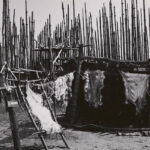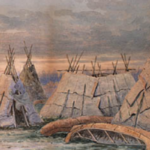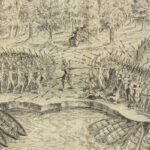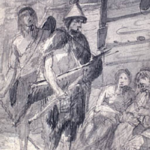Muskeg Lake Cree Nation: A Legacy of Resilience in Saskatchewan’s Heartland
The Muskeg Lake Cree Nation, part of the Plains Cree (Nêhiyawak) people, is a proud and vibrant community located in central Saskatchewan. With deep roots in the region’s prairies and boreal forests, the Muskeg Lake Cree Nation has cultivated a rich cultural heritage shaped by their connection to the land, spiritual traditions, and strong governance. Despite the challenges of colonization, they have preserved their identity, adapted to changing circumstances, and continue to play a leading role in cultural revitalization and Indigenous advocacy.
Ancient Origins: Guardians of the Plains and Forests
The Muskeg Lake Cree Nation’s history is deeply connected to the Nêhiyawak-speaking Cree peoples, who have lived in the central plains and boreal forests for over 10,000 years. Archaeological evidence, including ancient campsites, stone tools, and bison jumps, demonstrates their long-standing presence in these regions. Their way of life revolved around the seasonal cycles of hunting, fishing, and gathering, with buffalo playing a central role in their culture.
The area around Muskeg Lake provided an abundance of resources, allowing the Cree people to thrive. Their deep connection to the land is reflected in their language, Nêhiyawêwin, which includes specific terms for the landscape, animals, and spiritual connections they hold sacred.
Anthropologist Marianne Ignace, in Keeping the Stories Alive, writes, “The Muskeg Lake Cree’s understanding of the land is not just practical but deeply spiritual, emphasizing respect and reciprocity in their relationship with nature.”
Governance and Social Structure
Traditional governance among the Muskeg Lake Cree was rooted in consensus and collective decision-making. Chiefs and councils were chosen for their wisdom, bravery, and ability to guide the community. Elders were highly respected for their knowledge of traditions, laws, and spiritual teachings, and their counsel was central to decision-making processes.
The Muskeg Lake Cree organized themselves into family groups, each responsible for managing specific resources and territories. Seasonal gatherings provided opportunities to share knowledge, celebrate their connection to the land, and strengthen social bonds through feasts, storytelling, and ceremonies.
Historian Robin Fisher, in Contact and Conflict, observes, “The governance of the Cree nations, including the Muskeg Lake Cree, was deeply rooted in their cultural practices, ensuring harmony and resilience within their communities.”
Spiritual and Cultural Traditions
The spirituality of the Muskeg Lake Cree revolves around their relationship with the Creator and the natural world. Sacred ceremonies, such as the Sun Dance, sweat lodge rituals, and pipe ceremonies, are vital to their spiritual life, fostering healing, renewal, and unity.
Storytelling plays a central role in preserving Muskeg Lake Cree history and cultural values. Stories about Wisakecahk, the trickster figure, teach lessons about resilience, respect, and the importance of living in harmony with nature.
First Contact with Europeans
The Muskeg Lake Cree’s first recorded interactions with Europeans occurred during the fur trade era in the late 17th and early 18th centuries. These interactions introduced new goods, such as firearms, metal tools, and textiles, which were quickly integrated into Cree life. However, European contact also brought devastating consequences, including the spread of diseases like smallpox, measles, and influenza, which drastically reduced their population.
Historian Bruce Trigger, in Indigenous Peoples of Canada, describes these epidemics as “a demographic catastrophe that reshaped the cultural and social dynamics of Indigenous nations.”
Treaty 6 and Colonization
The signing of Treaty 6 in 1876 was a pivotal moment in the history of the Muskeg Lake Cree Nation. Like other Cree leaders, the Muskeg Lake Cree’s chiefs sought to protect their traditional way of life while adapting to the realities of settler expansion. Treaty 6 promised education, healthcare, and provisions during times of famine, along with the protection of traditional hunting and fishing rights.
However, the promises of Treaty 6 were often undermined by colonial policies, including the imposition of the Indian Act and the establishment of reserves. The Muskeg Lake Cree were confined to a fraction of their traditional lands, disrupting their way of life. Residential schools further eroded their culture, as children were forcibly removed from their families and prohibited from speaking their language or practicing their traditions.
Margaret Conrad, in A Concise History of Canada, writes, “The experience of the Muskeg Lake Cree under Treaty 6 reflects the systemic inequalities and broken promises that characterized Canada’s treatment of Indigenous peoples.”
Resilience and Cultural Revitalization
Despite the profound challenges of colonization, the Muskeg Lake Cree Nation has demonstrated remarkable resilience. Efforts to preserve Nêhiyawêwin and restore traditional ceremonies have been central to their cultural revitalization. Programs focused on youth education, language preservation, and cultural workshops ensure that future generations remain connected to their heritage.
The Muskeg Lake Cree have also been leaders in advocating for Indigenous sovereignty and economic self-determination. Their success in establishing the Muskeg Lake Cree Urban Reserve in Saskatoon in 1988 marked a groundbreaking achievement, demonstrating their adaptability and commitment to creating new opportunities for their people.
Anthropologist Marianne Ignace notes, “The Muskeg Lake Cree’s dedication to revitalizing their culture and asserting their rights is a testament to their resilience and determination.”
Environmental Stewardship
The Muskeg Lake Cree Nation has long been a steward of the plains and forests, managing resources with sustainability and respect for natural cycles. Their traditional ecological knowledge continues to guide their practices in hunting, fishing, and land management. In recent years, the Muskeg Lake Cree have worked to protect their lands from environmental degradation and promote sustainable development.
In The Resettlement of British Columbia, historian Cole Harris writes, “The Muskeg Lake Cree Nation’s approach to environmental stewardship reflects their deep understanding of the interconnectedness of cultural and ecological health.”
The Muskeg Lake Cree Nation Today
Today, the Muskeg Lake Cree Nation is a thriving community that blends traditional practices with modern governance and economic development. The establishment of urban reserves has expanded their economic base, providing new opportunities while supporting cultural and educational initiatives.
The Muskeg Lake Cree Powwow, an annual event, celebrates their culture, bringing together community members and visitors to honor their traditions. Partnerships with provincial and federal governments, as well as initiatives in education and sustainable development, reflect their commitment to building a vibrant future for their people.
A Legacy of Strength and Renewal
The history of the Muskeg Lake Cree Nation is a testament to their enduring connection to the land and their commitment to preserving their culture and traditions. From their ancient stewardship of the prairies and forests to their leadership in cultural revitalization and Indigenous advocacy, the Muskeg Lake Cree have maintained their identity and place within the dynamic landscapes of Saskatchewan.
As Robin Fisher writes in Contact and Conflict, “The Muskeg Lake Cree’s story is one of resilience and renewal, reflecting their strength and determination to preserve their way of life amidst profound change.”
References
Urban Reserves and Indigenous Sovereignty. The Muskeg Lake Cree Urban Reserve: A Model for Economic Development. Indigenous Business Quarterly, 1990.
Barman, Jean. West Beyond the West: A History of British Columbia. University of Toronto Press, 1996.
Carlson, Keith Thor. Living the River’s Legacy: The Fraser River and Coast Salish History. McGill-Queen’s University Press, 2011.
Conrad, Margaret. A Concise History of Canada. Cambridge University Press, 2012.
Fisher, Robin. Contact and Conflict: Indian-European Relations in British Columbia. UBC Press, 1997.
Ignace, Marianne and Ronald E. Ignace. Keeping the Stories Alive: Language, Land, and Culture in Indigenous Communities. University of Toronto Press, 2008.
Harris, Cole. The Resettlement of British Columbia: Essays on Colonialism and Geographical Change. UBC Press, 1997.
Trigger, Bruce G. Indigenous Peoples of Canada. McGill-Queen’s University Press, 1992.
Muskeg Lake Cree Nation. Guardians of the Land: The History and Culture of the Muskeg Lake Cree. Muskeg Lake Publications, 2015.
Treaty 6 Elders. Spirit of the Treaties: Stories from Treaty 6. University of Alberta Press, 1998.



